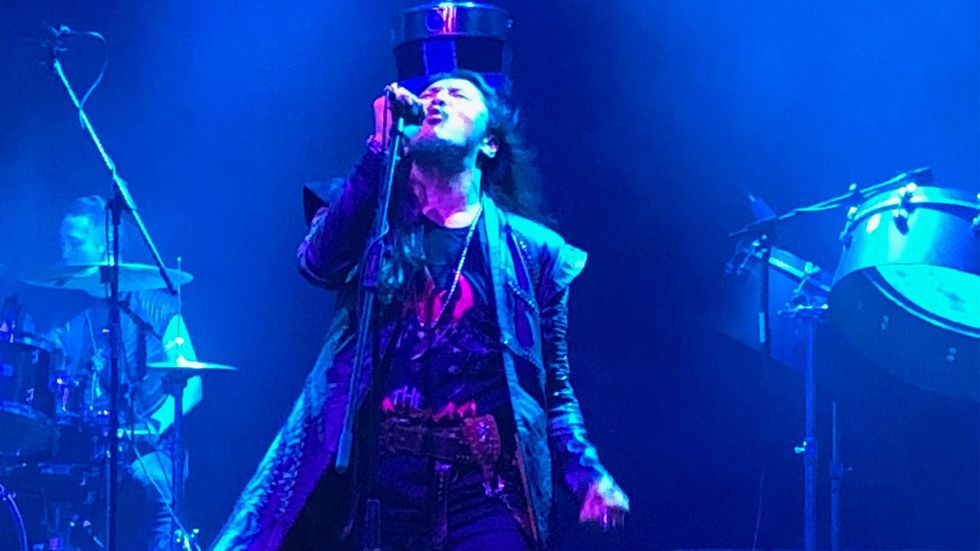Review
The Hu
Roundhouse, Sydney, August 7
Rating: Four and a half stars (out of 5)
“Hu! Hu! Hu!” Loud chanting of the crowd filled the building. Over the chants came the rumbling baritone of a throat singer, mingling with the shudder-inducing howl of a horse-head fiddle. From the stage, a long-haired man roared: “Sydney are you ready?” We were.
The smoke rising from the stage seemed to cling to them ethereally as the first guttural notes of their Mongolian tongue rang out. The Hu don’t sing in English: every vocal is sung in their native tongue, transcending the barrier of language. You don’t have to speak Mongolian to rock out to their tracks: the music has a soul that kept the capacity Roundhouse audience enthralled.
This Mongolian metal band have found their niche playing a distinctive blend of Western rock, traditional Mongolian instrumentation and throat singing. They call their music, “hunnu rock”, referring to the ancient Hunnu empire that spanned the eastern Eurasian Steppes, now modern-day Mongolia, around 370 AD.
Jaya’s showmanship dominated the stage ... he seemed possessed by the spirit of the warlord.
I tried to sing along, but I couldn’t possibly hope to recreate the power of the original dialect. I don’t think The Hu minded: all they asked was that you match their energy and judging by the ocean of banging heads and pumping fists, the crowd more than obliged.
Nothing captured this better than "Shoog Shoog". Lead singer Jaya recruited the crowd into his war band and rehearsed with a chanting war cry of “Shoog!” When The Hu then exploded into the song, the audience belted out that same chorus to follow Jaya’s orders.
The band has four primary members: Nyamjantsan Galsanjamts (Jaya) on lead vocals and flute; Galbadrakh Tsendbaatar (Gala) and Enkhsaikhan Batjargal (Enkush) on throat singing and morin khuur (horse-head fiddle); and Temuulen Naranbaatar (Temka) on the tovshuur (Mongolian guitar).

Throat singing is a unique musical style that can produce multiple pitches simultaneously, resulting in a sound akin to a rumbling bass. The Hu use a form of throat singing called khoomei, which involves sustaining the notes for long periods of time.
Formed in 2016, The Hu went viral with their 2019 hit, “Yuve Yuve Yu”,which now has close to 100 million views on YouTube. They caught the attention of Elton John who featured the band on his “Rocket Hour” radio show, calling them, “one of the freshest, most original bands I’ve heard in many, many years”. It wasn’t the band’s first trip to Australia. In March 2020, The Hu was trapped in Australia for several weeks by international border closures when the COVID-19 pandemic struck. In that time they wrote material which is featured on their latest album, Rumble of Thunder, due for release in September. It’s a fitting title, considering the musical storm they conjured up at Sydney’s Roundhouse for their final Australian show.
The show wasn’t all thunder and head banging. “Shireg Shireg” offered a respite from the metal maelstrom with the lilting hum of the flute and the pleasant twanging of the jaw harp, both played by Jaya.
Jaya’s showmanship dominated the stage during “The Great Chinggis Khaan”, which venerates the conqueror Genghis Khan, and he seemed possessed by the spirit of the warlord, his wild hair whipped about as he pumped his fists and stomped across the stage, eyes burning with a fiery delight.
Gala and Enkush, dressed in leather outfits of Mongolian style, provided the throat singing and morin khuur that was crucial for every song, while Temka shredded on the tovshuur.
Alongside the primary quartet, four other warriors joined the band as part of the touring crew, giving the gig its western touch by jamming on the guitar and pounding the drums.
You might think two opposing musical styles would be discordant, but you’d be wrong, everything flowed together with a practised harmony, as if The Hu had eliminated any difference between East and West.
The familiar “Yuve Yuve” Yu and “Wolf Totem”were standout performances: the booming of the drums, and the high-pitched whinny of the morin khuur stirred images of horses galloping across the Mongolian plains.
Just when it seemed the show had ended, the fan horde’s chants of “Hu! Hu!” summoned the band back one more time.
With a blend of powerful instrumentals, spine-tingling vocals and vibrant showmanship, The Hu cemented themselves as titans of the new age of rock. They prove that extraordinary music shouldn’t be disregarded because of language barriers.
However, I just might learn Mongolian for their next concert.



Cultural ping pong: Dancing on the edge of two worlds